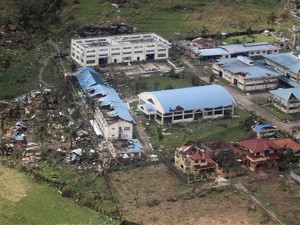US-based Catholic charity vows to raise P2.2B for ‘Yolanda’ rehab

This photo released by the Malacanang Photo Bureau shows an aerial view of Tacloban city, Leyte province in central Philippines Sunday, Nov. 10, 2013, after Typhoon Haiyan ravaged the region in the Philippines. AP FILE PHOTO
MANILA, Philippines—A United States-based Catholic charity has committed to raise P2.2 billion for the recovery of areas ravaged by Supertyphoon “Yolanda” (international name: Haiyan) in Samar and Leyte over the next three to five years.
The Catholic Relief Services said its aid efforts have now shifted from emergency assistance to “long-term recovery and stability programs” to help the affected communities return to normal.
With the recovery expected to take three to five years, the agency has committed to assist 100,000 families, or 500,000 people, with shelter, living supplies, water, sanitation, and livelihood.
“We will focus on Leyte and Samar islands, primarily in the areas of Palo, Tacloban, Ormoc and Eastern Samar. CRS is committed to raising $50 million (around P2.2 billion),” it said in a press statement posted on the website of the Catholic Bishops Conference of the Philippines on Wednesday.
The agency noted the need for durable building materials as many survivors have started rebuilding homes mostly using materials they had gathered from the rubble.
Another major challenge in the rehabilitation and recovery operations, CRS said, would be to remove the thousands of fallen coconut trees.
CRS said food distribution was decreased two months after the typhoon, allowing the people to start earning an income.
Coconut farmers and fishermen have taken the biggest hit to their livelihoods as the new coconut trees would take five to seven years to mature while boats would be costly to rebuild, the CRS said.
“More than one-third of the Philippines’ labor force depends on agriculture for income. With land and crops devastated, we plan to help people recover their agricultural and fishing assets,” it said.
The CRS has so far provided 40,000 families, or 200,000 people, with emergency shelter, potable water, and offered sanitation and debris clearing services.
Carpenters are also being trained to work with community members to build shelters. Carpentry tools such as saws and hammers are provided.
It has also provided cash-for-work opportunities to people who participated in the clearing of roads and public places of debris left by the typhoon, the agency said.
“We will soon begin to support permanent housing solutions that use local materials, as well as corrugated iron sheets to construct similar A-frame homes of more durable, disaster-resistant materials,” the CRS said.